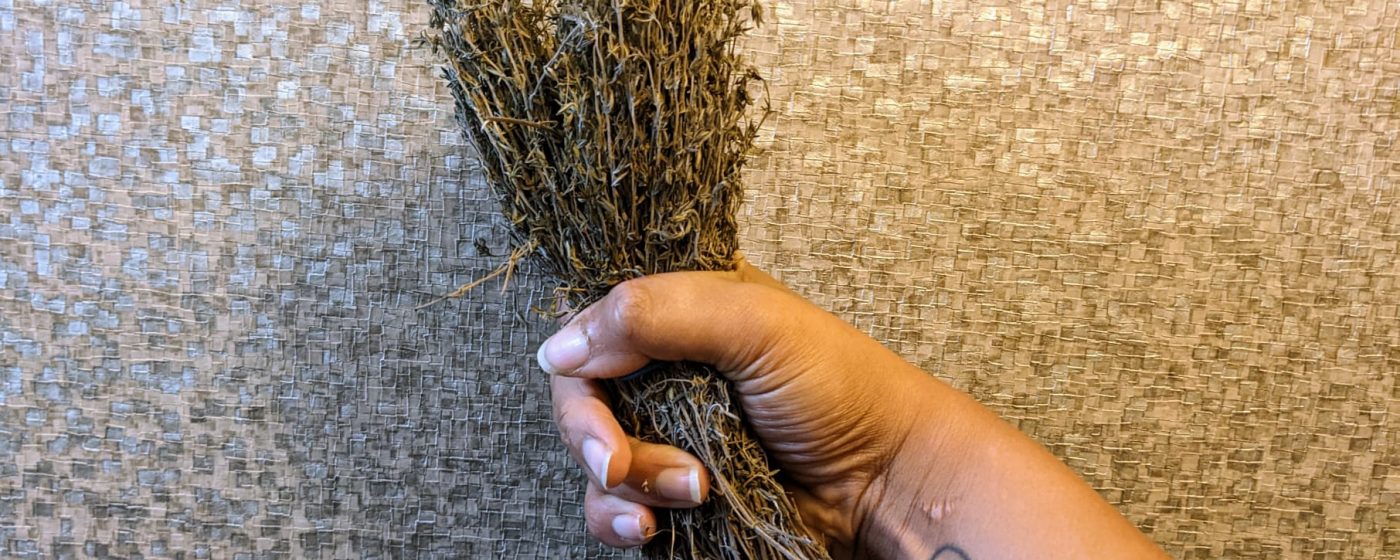- Venue
Studio Voltaire
-
Date
Thursday 29 September 2022
-
6.30-8.30pm
-
Admission
Invite only
- Artists
Soul food is more than chitlins and collards greens, ham hocks and black-eyed peas. Soul food is about people who have a lot of heart soul – Vertmae Smart-Grosvenor (Culinary Anthropologist)
For our first Artist Kitchen Salon as part of our Research Network programme: If Sea is History – What is Nation Safiya Robinson, founder of Sisterwoman Vegan shares her research exploring Afro-Caribbean supermarkets as a symbol of nationhood for the British Black diaspora.
Safiya’s work uses food as a tool to explore community, education and mindfulness and the salon opened with a grounding mediation. Adding intentional nourishment in the form of a supper club, Safiya creates a space for critical food conservation. The menu for the salon incorporated thyme as an ingredient from the welcome drink to starter, main and dessert (below). Each dish represents a different element of her research. Invited guests interact with the feel and smell of thyme and the research itself while being transported to Rye Lane, a southeast London hub for Afro-Caribbean supermarkets with an atmospheric soundscape.
Thyme is often found in African and Caribbean dishes including jollof and jerk, which are recognised as key markers of West-African and West-Indian cultural identity respectively. However, it was not originally grown within these regions highlighting the tension between the construction of diaspora identity and nationhood.
While Afro-Caribbean supermarkets can be a sign to members of the black diaspora that “we are here”, historically they are not owned by people within the community and the products sold are rarely black-owned. Food banks often don’t have cultural foods available highlighting that members of the black diaspora are not considered part of the British national identity.
As part of exploring this salon, everyone was encouraged to bring an item from their local Afro-Caribbean supermarket to donate to Brixton People’s Kitchen, a local food charity in-between Stuart Hall Library and Studio Voltaire.
A few readings that enriched the experience of the evening can be found below.
Facilitator
Safiya Robinson is a creative cook, writer, wellness advocate and the founder of sisterwoman vegan, a plant based social enterprise exploring wellness through food. A creative and vibrational cook , she creates plant based dishes inspired by her Black American, Jamaican and British heritage and believes that food is a healing modality, centring community, education and mindfulness in her work. With a focus on holistic wellness and mental health she creates spaces for critical food conversation and seeks to empower us all to think more critically about the food that we eat. Through supper clubs, cooking lessons, writing, events and food education, her focus is intentional nourishment. She is currently enrolled in a masters programme in the Anthropology of Food at SOAS University.
Reading List
Da Silva, Rui. A Quick Ting on Plantain. Jacaranda Books, 2022.
Harris, Jessica B. High on the hog: A culinary journey from Africa to America. Bloomsbury Publishing USA, 2011.
Ngimbi, Emmanuella. Portsmouth and Plantain Chips: “How the pandemic affected the ‘African Food Store”. Vittles, accessed 21 September 2022.
Schalbroeck, Eva. “Season with Money, Knowledge, Civilisation, and Exchange: Culinary Herbs and Spices during Colonial Rule in the Congo (1885 to 1960).“
Smart-Grosvenor, Vertamae. Vibration cooking: Or, the travel notes of a Geechee girl. University of Georgia Press, 2011.
Tookes, Jennifer Sweeney. ““The food represents”: Barbadian foodways in the diaspora.” Appetite 90 (2015): 65-73.
Zubaida, Sami, Richard Tapper, and Claudia Roden. A Taste of Thyme: Culinary Cultures of the Middle East. Tauris Parke Paperbacks, 2001.
Image credit: Thyme by Safiya Robinson, 2022.
